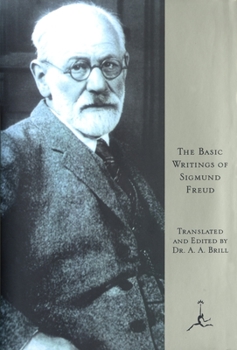The Basic Writings of Sigmund Freud
Select Format
Select Condition 
Book Overview
This classic edition of The Basic Writings of Sigmund Freud includes complete texts of six works that have profoundly influenced our understanding of human behavior, presented here in the translation by Dr. A. A. Brill, who for almost forty years was the standard-bearer of Freudian theories in America. - Psychopathology of Everyday Life is perhaps the most accessible of Freud's books. An intriguing introduction to psychoanalysis,...
Format:Hardcover
Language:English
ISBN:067960166X
ISBN13:9780679601661
Release Date:July 1995
Publisher:Modern Library
Length:992 Pages
Weight:2.06 lbs.
Dimensions:1.9" x 5.8" x 8.3"
Customer Reviews
4 ratings
The Basic Writings of Sigmund Freud
Published by Thriftbooks.com User , 15 years ago
Hey, I bought this book for reference. BUT, if you have never understood 'Hamlet', buy this and all will become clear. For the price, one of the great mysteries of life made clear. What more could one ask? Enjoy!
A Good Introduction and Reference
Published by Thriftbooks.com User , 18 years ago
The Brill translation of the basic early writings of Sigmund Freud, although arguably not the most accurate translation, provides a good introduction to Freud's early work. We can read the critics and followers, yet sometimes we just have to go back to Freud's actual work. I keep my copy handy for reference and review.
Basic Writings of Freud by Brill
Published by Thriftbooks.com User , 19 years ago
This is an excellent work for Freud enthusiasts. The work discusses the theoretical underpinnings for behavioral characteristics popularized by Freud. For instance, the proclivity to forget is related to a personal motivation tosuppress unpleasant memories. Dreams tend to depict unfulfilled wishes. Pain and disgust are more frequent aspects of dreams than pure pleasure. The author explains how childhood experiences both good and bad may resurface in our dreams. Our memory can be challenged to recall things long dormant. Night hallucinations can be due to perceived rejected sexual impulses.Freud explains how seemingly contradictory thoughts can coexist side by side. The concept of psychological tension may be related to a displeasure or aversion. Freud discussed sexuality.For instance, he noted that bisexual tendencies could be interpreted within the context of a female brain in a male body.The book brings out many aspects of human behavior that we rarely dwell on consciously. It is perfect for a class project inscience, psychology or medicine. Freud's theories tend to be verycomplex. This work reduces some of the deepest complexities tosimple English.Finally, the book helps us to understand the dynamics of why we behave as we do. This book explains important strategies to the classic flight/fight phenomena and accomodativestrategies aimed at reducing behavioral tensions/conflicts.
This is a great deal.
Published by Thriftbooks.com User , 21 years ago
My favorite part of the book is the fourth major topic, "Wit and its Relation to the Unconscious." The jokes might seem a bit stale. My printing of this book is copyright 1938, and comparison of its index with the online version of pages shown indicates that the newer version is not quite the same number of pages, but the book itself is the same as the original. For people who have trouble remembering psychological concepts or intellectual approaches to anything, but who never forget a joke, Freud's ability to keep referring to the same joke in different contexts offers an ideal opportunity to see how an expert in a field can intertwine basic concepts with known ideas to create the sensation of intellectual progress. Speaking of experts, the index has 16 entries for Heine, the first of which is merely a footnote on how dreams might work like Heine, who was famous for making the bad poetry of the King of Bavaria (Herr Ludwig?) ridiculous, in THE INTERPRETATION OF DREAMS. The poem is only in German in the edition I have, so the comment, "He does it by using even worse rhymes," might only be funny for people who know what German sounds like. The final mention of Heine, which might be to a joke that Freud had not told before, is to a verse in which he complained, "until at last the buttons tore from the pants of my patience," in Freud's discussion of the various forms of the comic. You might not appreciate how big this book is until you have read it.




